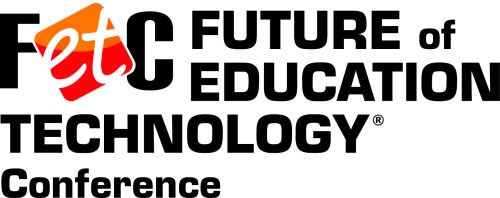] Salman Khan, the founder of Khan Academy, was the first of three keynotes at the 2019 Future of Education Technology Conference (FETC). During his presentation, he shared how an openness to learning, drive for innovation, and a willingness and ability to try new things is the foundation of his success and traits he wants to instill in students using Khan Academy. His story was one of hard work, determination, “delusional optimism,” the availability of technology, and a little luck – something that resonated with the school leaders present throughout the room.
Salman Khan, the founder of Khan Academy, was the first of three keynotes at the 2019 Future of Education Technology Conference (FETC). During his presentation, he shared how an openness to learning, drive for innovation, and a willingness and ability to try new things is the foundation of his success and traits he wants to instill in students using Khan Academy. His story was one of hard work, determination, “delusional optimism,” the availability of technology, and a little luck – something that resonated with the school leaders present throughout the room.
For those who don’t know the backstory, Khan shared how he began using online videos to tutor his cousins located across the country in 2008. He quickly found that online instruction removed barriers to learning, including virtually anytime, anywhere consumption of the content and reducing the pressure of in-person learning to always “understand” concepts as they are taught. By using video tutorials, his cousin was able to take charge of her learning and allowed her to move through concepts at her own pace. Coupled with the ability to revert back to prior lessons, she was able to master each lesson in order to advance to more difficult concepts.
Khan eventually began posting his tutorials on Youtube to share his content with other family members and, on the off chance that another student could benefit from the materials, began to share these videos with the larger online community. What he didn’t know at the time was these videos were the first resources for what would eventually become Khan Academy, which today provides a variety of online learning resources to 70 million learners across 190 countries.
At its foundation, the non-profit aims to close the knowledge gap, a prevalent theme throughout much of the conference, which results from both a lack of access to learning resources, as well as the inability for traditional models to help students and teachers understand the impact of the gaps represented through numerical or letter grades. Khan pulls from his own experiences of hearing Bill Gates talk about his children using Khan Academy to Sultana, a refugee using the program to access learning materials that were made unavailable by external forces, to paint the picture of the importance of providing every student, regardless of socioeconomic status, geographic location, or learning ability the resources to learn. By moving to mastery-based standards for education, learners are able to close their knowledge gaps through remediation and differentiation of materials.
With an unrelenting determination to continue to build upon and to improve the learning resources offered to students, Khan continues to move the needle in online and digital education.
Further Reading
- The Ed Tech Round Up – Creating An Effective EdTech Ecosystem & Making the Best Use of Tech Tools
- edCircuit – FETC 2019: Making the Right Decisions Around Data System and Technology Tools
- Broadway World – Salman Khan to Give Opening Keynote at 2019 Future of Education Technology Conference






